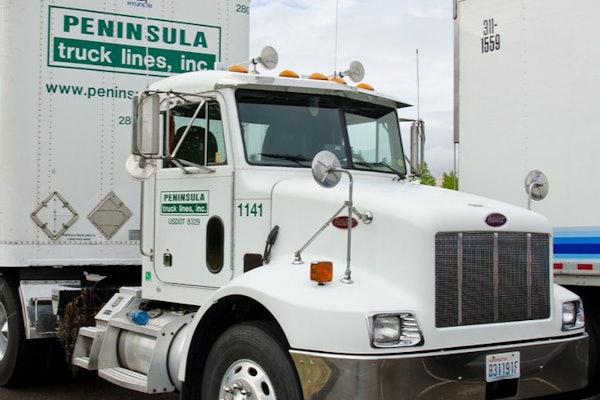In this day of USB ports and standard protocols, you expect to be able to use electronic devices just about anywhere. But on the open road, interoperability among systems used to bypass weigh stations, collect tolls and cross borders remains a work in progress.
Since early 2004, National Freight Inc. (NFI) has used a single system to bypass weigh stations and roll through toll collection booths. Each truck has a PrePass Plus transponder that communicates with roadside readers at weigh stations that use the PrePass system and with toll booths that use the E-ZPass toll collection system.
When moving through West Virginia and Illinois, NFI’s vehicles move freely through both weigh stations and toll roads. In most other states, however, the solution works for one or the other – but not both. In the Midwest, most weigh stations are equipped with PrePass. Most states in the Northeast use E-ZPass but do not have PrePass-equipped weigh stations, says Ed Powell, asset manager of NFI, a 2,000-truck carrier based in Vineland, N.J.
“In an over-the-road environment, we’re constantly in and out of both areas,” Powell says.
PrePass Plus uses the Mark IV Fusion transponder, which is compatible with all E-ZPass readers. PrePass and the Inter Agency Group – an alliance of local toll authority agencies – use a common set of technical standards and protocols for sharing information. ACS is the system administrator of PrePass and, for many toll authorities, E-ZPass. Another party involved is Heavy Vehicle Electronic License Plate (HELP) Inc. The company is a nonprofit partnership between motor carriers and government agencies that operates the PrePass program.
For NFI and many other fleets, the benefit of interoperability between weigh stations and toll roads goes beyond using a single transponder. With PrePass Plus, NFI now has one monthly billing statement from PrePass that includes all tolls charged by E-ZPass across many states. The company no longer has to set up E-ZPass accounts with different agencies or prepay toll charges.
“Now you have one bill for all of them,” Powell says. “And you still get all of the volume discounts.”
Powell says that as HELP Inc. continues to expand the number of PrePass weigh stations, he anticipates that the list of toll authorities that interoperate with PrePass will grow.
Currently, NFI uses three other automatic toll collection systems besides E-ZPass: Fast Lane in California, Pikepass in Oklahoma, and SunPass in Florida.
“We have to have them, but I’d like to see further integration,” Powell says.
PrePass and E-ZPass use the same protocol for the transponder signal. Toll authorities other than E-ZPass use a different protocol.
“Right now, toll systems and PrePass are closed systems – basically meaning one vendor’s equipment,” says Barbara Catlin, a spokesperson for TransCore. In the Northeast, the Inter Agency Group’s E-ZPass uses Mark IV RFID equipment. In the Southeast, several toll agencies use TransCore’s RFID equipment.
With a new multiprotocol reader that TransCore announced in late September, toll agencies now could read a mixed tag population, giving a toll authority the flexibility to work with multiple vendors and migrate easily to newer technologies, Catlin says.
TransCore’s new reader could overcome some intellectual property barriers to interoperability, but other challenges remain. Market competition remains an obstacle to a single transponder for all weigh stations and toll roads. The components of the PrePass system used at weigh stations – the RFID readers, database and software – are all privately owned by HELP Inc. As such, HELP Inc. has competitive reasons not to allow just any roadside reader to use its transponder signal or carrier database, says Cassie Princkey, vice president of operations for ACS.
“It has more to do with states controlling the protocol,” Princkey says.
So even though technology now can eliminate any technical barriers, replacing RFID readers most likely isn’t too high on most states’ priority lists. But with more than 390,000 trucks now using PrePass, the demand for a single transponder has become hard to ignore.








